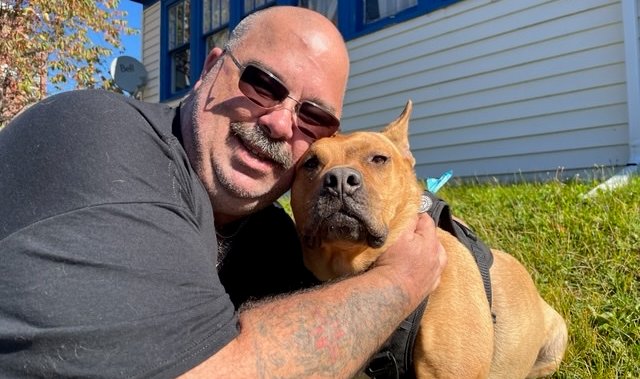A Nova Scotia man with PTSD and diabetes says he was denied entry to a local community centre for a hockey game because he could not provide documentation for his service dog, despite the critical role the dog plays in looking after him.
Darren Cox, a former bodyguard, relies on his service dog Calaway to help manage stress and monitor his health. Calaway is specifically trained to assist Cox during medical emergencies and pick up on signs that Cox is in need of assistance, like instances where he faints due to his diabetes.
The two have been inseparable for five years since Calaway was trained as a young pup in the U.S. and brought to Canada to look after Cox.
“We probably know each other better than best friends,” Cox said.
The pair ran into a problem last week, when Cox encountered an unexpected obstacle while trying to attend a hockey game at the Rath Eastlink Community Centre in Truro.
Upon arriving at the local community centre, Cox says he was stopped by a security guard who said that he needed to show provincial ID for his service dog. Cox had documentation for Calaway from the U.S, where he was trained, but did not have a Nova Scotia-issued ID for the dog. Cox told Global News that he was caught off guard and had never been asked for such documentation before.

Get daily National news
Get the day’s top news, political, economic, and current affairs headlines, delivered to your inbox once a day.
“We showed up with tickets in hand, (Calaway) all in his gear. And a security guard approached me, saying I needed ID. I was like, ‘I’ve never heard of that. I was led to believe I had done everything by the book,’” Cox recounted. Following what Cox calls a “discriminatory” encounter, he returned home.
Cox believes he should have the same accessibility to public events as other attendees, especially considering the dog’s role in emergency situations.
“If I want to go to a game, I should have the same privilege as anybody else,” he said. “And if I require medical attention, Calaway needs to let somebody know because at nearly every hockey game I’ve been to, I’ve never seen a first aid-trained person there that is clearly identified as medical staff.”
In a statement, Rath Eastlink Community Centre says it contacted the provincial government following the interaction to ensure its actions aligned with provincial standards for service dog regulations.
The province responded that the decision to deny entry based on a lack of service dog ID is at the discretion of each venue. It also said identification issued by the province is available on a voluntary basis but is not required.
Karen Forsyth-McNeil, registrar of Service Dogs for Nova Scotia, tells Global News that “It would be up to their (the venue’s) policies and procedures.”
However, even though the ID provides certain protections under provincial statutes, “service dog owners would still be protected from discrimination under the human rights act if they don’t have one,” Forsyth-McNeil said.
Cox believes the “grey areas” in the regulations around service dogs need to be addressed.
“There are some aspects where I do hold the Rath Eastlink Centre responsible,” he said
Following the incident, the rink offered Cox two free tickets to an upcoming game, but he says he’s in no hurry to go back.
“To face the humiliation and embarrassment that I did with my dog leaves an imprint on my dog too,” Cox said. “We’ve worked so hard to meet qualifications.”
Following the incident, Cox is now hoping Calaway will be provincially recognized to avoid any future challenges.
© 2024 Global News, a division of Corus Entertainment Inc.


